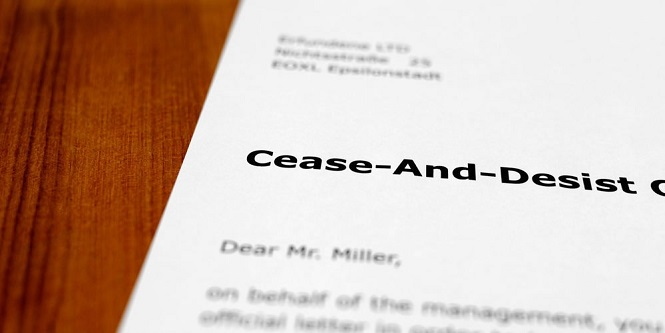If someone does something which you believe to be wrong, or harmful to your business, you do not always need to instruct your commercial lawyer to start court proceedings. For a start, not every so-called wrongdoing warrants a court case, and besides, there are other options available to you.
One of those options is to send the person or the business who you believe has stepped out of line, a cease and desist letter. These are letters sent, normally by a lawyer, to a third party who you believe has undertaken an activity or an action, which could be infringing your rights, or harmful to you.
Some of the most common reasons for people sending a cease and desist letter are:
Harassment
Intimidation
Defamation
Trademark Infringement
Copyright Infringement
Patent Infringement
Breach of Contract (by an individual, a business, or an organisation)
Cease and desist letters can ultimately lead to court action if the activity it refers to does not stop, and therefore it is highly recommended that you ask a fully qualified commercial lawyer to draft it for you. The last thing you want is a counter to your letter because you have not worded it correctly, or worse, have worded it in such a way that it can be construed as breaching the other party’s rights.
The letter can actually be used as evidence in your court case to show that you made reasonable attempts to request that the actions be stopped. They are also used in relation to you claiming that the other party pays your legal costs, given that they ignored the letter and continued with the action in question.
A cease and desist letter basically has three purposes. The first is to alert the person who is the subject of the letter that their action or behaviour is a breach of your rights, and that it must stop. This is important because the person who is in default may not actually be aware of they are doing something wrong. Your cease and desist letter should enlighten to that fact and include the details of what those wrongful actions are.
As well as alerting the other party, it is another basic function of a cease and desist letter to tell them that they must stop and that they must stop immediately. Further to that, the letter should also indicate that should they fail to stop, that they will be subject to legal proceedings by yourself, and that you will be seeking damages from them.
In many cases the order to stop and the threat of legal action, including damages warning enough for most to stop their activities or actions. If they do not stop immediately, they may at least seek clarification from you, or possibly negotiate an amicable way forward.
Although a cease and desist letter might be sent from one individual to another, there is absolutely no obligation to keep it private, either on you or the other party. There may be a reason for the person sending the letter making it public, such as hoping that the publicity that may arise from it, may cause the other party to rethink their actions.
Conversely, those who receive a cease and desist letter may choose to go public, because it is their belief that their activities are correct, legal, and warranted. They may use making the cease and desist letter public to suggest that in fact they are the one being harassed, and it is they who are the injured party.

